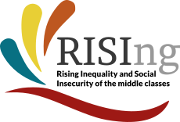About
RISIng contributes to a better understanding of the crisis of the middle class in Italy and Europe by focusing on the spread of several forms of social insecurity. By social insecurity we mean the risk of experiencing economic uncertainty, income loss or financial strain, which may be more or less transitory and of limited duration. Such adverse conditions represent a threat to the material independence of individuals and households.
RISIng will last 36 months, starting in August 2019.
RISIng is divided into the following tasks:
WP1 – Measurement of Social Insecurity
WP2 – Explaining the drivers of the Social Insecurity
WP3 – Insecurity and inequality: at the crossroad of events and attributes
WP4 – Social insecurity, employment and welfare
Goals
RISIng will pursue the following aims:
- Provide an encompassing measurement of social insecurity;
- Identify the main drivers of social insecurity;
- Assess the distribution of insecurity between and within social classes;
- Assess the role of welfare and employment policies in preventing the spread of social insecurity or protecting individuals from it.
Main achievements of the RISIng will be: an empirical test of the thesis of the “crisis of the middle class”; the elaboration of a Portfolio of indicators; a scrutiny of the main drivers and the impact of social insecurity on the stratification system; and a final interpretation of the role played by welfare policies.
These results will be obtained through the creation of a multi-disciplinary research team and by carrying out an original longitudinal analysis.

